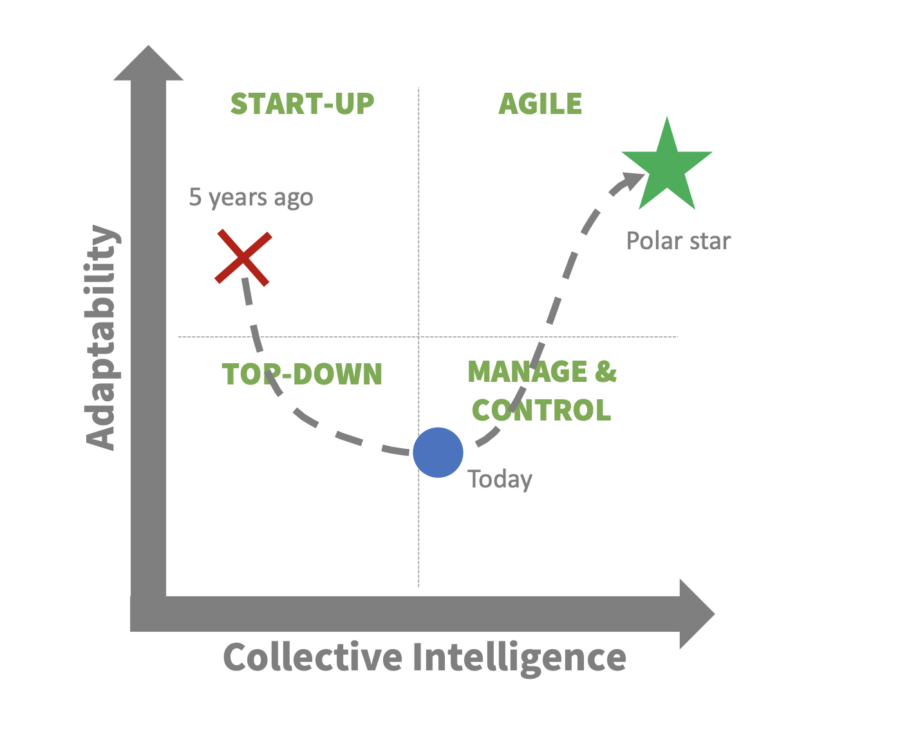Since 2017, AccelerationLab Ltd. has been actively engaged in supporting organizations, teams, and individuals in enhancing their global performance. With the belief that “change” is now a constant, the company supports corporations in becoming Learning Organizations and individuals in becoming Emerging Practice Leaders. AccelerationLab is committed to partnering with its clients, providing friendshoring support, as adaptation takes time, and we strive to be there for both the good and less good moments.
We provide organizations and individuals with development support based on data and life sciences, Experiential Learning, Organizational Development Consulting, and Coaching services. AccelerationLab Ltd. has dedicated more than 30% of its resources to research projects to establish useful models and practices.
In our practice, we recognize the importance of starting where the organization truly is. Speaking of the position of the organization is an approximation, as each division, department, and unit share commonalities but also develop their own practices and habits, resulting in different sub-cultures. A common and simple example comes from comparing accounting with marketing and sales, two units that experience different needs and therefore require different “nutriment” to continue developing and contributing to the company’s mission and vision. Providing each unit with what it needs is what we call “starting from where people are”.
To do so, we have developed quantitative assessments that provide clear maps and position individuals and units with respect to meaningful dimensions. These maps help measure the distance to the goal, the distance between units, and define workable scenarios based on encountered geography and peculiar positioning.
 We are proud of our authored and validated models used for organizational diagnostics. First, with the Systemic Agility model, we measure the adaptation of the organization/teams/leaders to the environment to provide development guidelines to keep the environment in check. The model posits that organizations leverage methods and culture that sit on a continuum ranging from industrial (called modern) to post-industrial (called postmodern) practices. It’s the VUCAness that dictates the optimal positioning in the continuum. The higher the VUCAness, the more postmodern the practices should be, and any deficit leads to tensions that affect global performance.
We are proud of our authored and validated models used for organizational diagnostics. First, with the Systemic Agility model, we measure the adaptation of the organization/teams/leaders to the environment to provide development guidelines to keep the environment in check. The model posits that organizations leverage methods and culture that sit on a continuum ranging from industrial (called modern) to post-industrial (called postmodern) practices. It’s the VUCAness that dictates the optimal positioning in the continuum. The higher the VUCAness, the more postmodern the practices should be, and any deficit leads to tensions that affect global performance.
 Second, with our Employee Value Proposition model, we measure the perceived value produced by the corporation, looking at the importance and satisfaction of meaningful factors. While satisfaction is a construct established through descriptive statistics, the importance measurement is established using multivariate analysis. The combination of satisfaction and importance helps to define priorities. The model illustrates the importance of intrinsic and extrinsic motivation factors in enhancing employees’ experience. Retention and talent attraction are not solely about pay, and our model helps take the right actions leveraging what really and specifically matters.
Second, with our Employee Value Proposition model, we measure the perceived value produced by the corporation, looking at the importance and satisfaction of meaningful factors. While satisfaction is a construct established through descriptive statistics, the importance measurement is established using multivariate analysis. The combination of satisfaction and importance helps to define priorities. The model illustrates the importance of intrinsic and extrinsic motivation factors in enhancing employees’ experience. Retention and talent attraction are not solely about pay, and our model helps take the right actions leveraging what really and specifically matters.

Our Organizational Development methodology helps navigate the complexity of corporate dynamics, keeping goals and means, operational and cultural practices aligned while always considering the context using an iterative approach (PDCA) that promotes baby steps towards objectives. This methodology has proven efficacy in developing Systemic Agility, Employee Value Proposition, and supporting any significant cultural change.
Our Integral Coaching practice for individuals and managers promotes personal mastery and vertical development. Our team coaching practice promotes collective intelligence and advocates the use of tensions as a trigger for growth.
To complete our offering, we are eager to support transformation with our training practice and a number of “Off the shelf” courses such as:
- Systemic Agility practitioner
- The performing group (leveraging collective intelligence)
- Ready for VUCA
- Behavioral agility
- Agile leadership
- The consultant’s posture
- The art of managing boundaries
- Knowledge management
- The keys to vertical development

